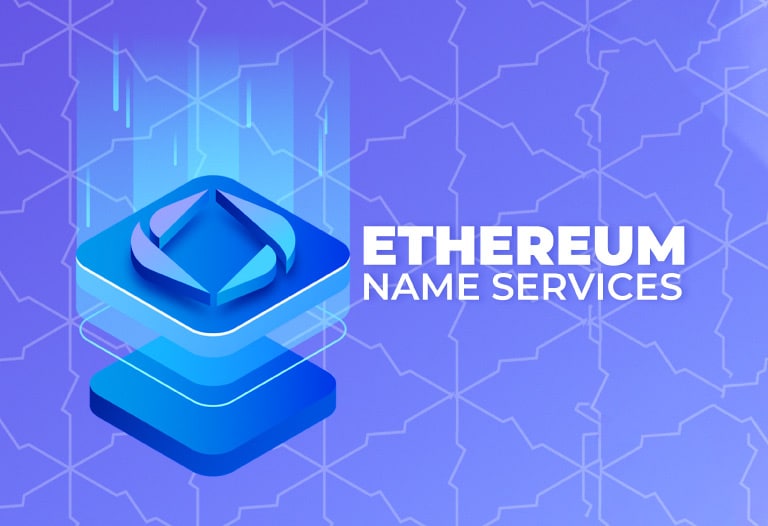
Table of Contents
ToggleIf you are a user of the world of cryptocurrencies, you probably know the Ethereum network. This network, in addition to having the second largest cryptocurrency, has a large number of services and applications that make it one of the most widely used. Therefore, today we will talk about one of its main services, Ethereum Name Service or ENS.
Ethereum Name Service is a name designation service targeted at walllet addresses, hashes and other machine-readable identifiers. Reading strings of data can be a difficult task at easily readable addresses. The operation of ENS is easily comparable to the domain name system (DNS) used for web pages.
Following its development, ENS put popular six-, five-, four- and even three-letter domain names up for auction to interested users ( ex. Jim.eth). Each domain contains .eth at the end and can be attached to multiple cryptocurrency addresses, hashes and other information.
Over time, this system has changed. Nowadays, we can easily buy names without having to participate in auctions or rent them per year. Domain prices vary depending on the length of the name we want to rent. A curious fact is that owners of an ENS domain as of October 31, 2021, are entitled to an airdrop of ENS governance tokens. The deadline to claim this airdrop is until May 4, 2022. Below we will tell you all about this system and how it works.
Why was Ethereum Name Service created?
Ethereum Name Service, as we already know, is a project based on Ethereum. Its launch took place on May 4, 2017 and was led by Alex Van de Sande and Nick Johnson of the Ethereum Foundation.
The goal of this project is to allow users to display large Ethereum public addresses in a simpler and shorter text-based way. Thanks to this system it becomes easier to share, use and remember addresses and other data. Ethereum Name Services, in a nutshell is responsible for transforming machine-readable numbers such as 0xAc9703a7D398351b8bT66C439e05d8u3259aeP5C into a readable alternative option for users. This mechanism is an important pillar to improve the adoption of blockchain technology.
It is worth noting that Ethereum Name Services is not only limited to wallet addresses. It is also used to represent transaction IDs, hashes and metadata, data frequently found in the crypto world, and so on.
ENS is also characterized by the launch of a governance token. This token is part of its transition to a decentralized autonomous organization or DAO. Following the rapid increase in the price of the token, ENS has become very popular and its users have increased significantly.

How does ENS work?
The operation of Ethereum Name Service is relatively simple. The first thing to know is that it uses non-fungible tokens or NFTs of the ERC-721 format to achieve the representation of a unique address. We can do domain exchanges through the sale or transfers of NFTs to other users. This is possible, as wallet addresses and all related information is tied to each token. These tokens are managed by the owner.
Top-level domains such as .eth are owned by a smart contract known as a registrar. This smart contract controls the creation of subdomains.
The process of purchasing an Ethereum domain name is very simple. First we verify that it is available and if it is we can rent it on a yearly basis. However, the most popular domains were initially auctioned off. The highest bidder who wins the domain has the power to attach addresses, create subdomains and even lend or sell their domain name.
What can we do with ENS?
Maybe you’ve ever made a mistake when sending cryptocurrencies with many addresses. If you have, this is something you can avoid with ENS. Thanks to this system it would be just as easy as with the system we use to store a phone number of any friend. ENS offers its users the opportunity to convert long numbers into easy-to-remember words. This system creates a more straightforward experience with less chance of errors.
The owner of an ENS domain also has the possibility to create sub-domains to which he can later assign other data. This does not always have to be a wallet address. Domains can be used to redirect to a smart contract, transactions or metadata.

How much does it cost to obtain an ENS domain?
In the cost of an ENS domain there are two possible parts; the first is the auction costs and rental costs. The price of an ENS domain name at auction used to depend on the popularity of its name. There are some recognizable names such as Sol, Mar or ETH. Such names usually fetch quite high prices. Other more expensive domains are those that include short three-letter words. Here are some examples of the prices paid for domain names.
-
- sportsbet.eth cost $142K
- gmi.eth cost $96,7K
- casey.eth cost $89,9K
Once we have secured the ENS domain, the next step is to pay an annual renewal fee in ETH. These fees are represented in USD, however, they are converted using an exchange rate provided by the ETH/USD oracle of the Chainlink network. To get an idea, the annual renewal cost is 5 USD per year. This price is for names with five characters or more, but as we already know, the fewer letters the name has, the more expensive the price becomes.
If one thing is clear, it is that ENS has been a breakthrough in the world of cryptocurrencies. Thanks to this mechanism we can create easily accessible ways to interact with a blockchain.


